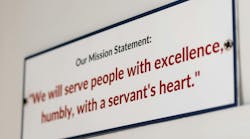A culture of servant leadership is one of the most important attitudes you can develop in your team. Servant leadership is one of our core values at Oilstop and began with our founder, Larry Dahl, and his keen focus on leading by serving others. Developing a culture of servant leadership at your quick lube will ensure your team always puts your guests and team first, which will result in growing your business.
Servant leadership is a style of leadership in which you focus on serving your team first. Leading your team by making sure their needs are met allows your team to focus fully on serving the guests in your service center.
Instead of viewing leadership as a system of rank and a structure for decision making, servant leaders see leadership as an opportunity to serve their team and ensure they are heard, empowered, and trusted.
At Oilstop, we have lived by the model of servant leadership for 35 years. We seek to empower our service center managers to “always do the right thing” when faced with decisions and regularly remind our leaders that our job is to serve our team, whose job is to serve our guests.
This model of leadership can transform a culture from one where staff members only do the minimum required work to be satisfactory, to one where team members are looking for ways to go above and beyond.
Servant leadership can seem overwhelming and challenging to put into practice. We have discovered several simple and tactical steps to model servant leadership.
First, start by asking your team questions and then listen to their answers. Ask your team what things your business does well and what things your business needs to improve. Ask your team what suggestions they might have to improve those needs.
By asking questions and then quietly listening you are opening up space for your team to voice their opinions and guiding them to be a part of the solution. By involving your team in these strategic conversations and listening to their feedback, you are modeling servant leadership. Servant leaders seek to empower their teams to solve problems, not solve problems for their teams.
One of my favorite questions you will hear asked dozens of times each day at Oilstop is the first words out of our team’s mouth whenever they pick up a phone call: “How may I serve you?”
This is not a subtle way to implement servant leadership. Whenever a staff member or manager calls our leadership team, you’ll hear those words asked. And I’m proud to say they really mean it.
Asking “How may I serve you?” is simple, but immediately shows humility and aligns the conversation towards serving your team.
Next, seek out ways to support your team as they work to improve problems. This could look like empowering them to order some new tools, equipment, or cleaning supplies.
This could look like letting them try a new task or responsibility or teaching them to take on a new role. By prioritizing the growth and development of your team, you are demonstrating that your greatest priority is serving them.
Finally, invest in systems that will help develop a culture of servant leadership across your business. At Oilstop, this looks like having an entire mission department focused on finding ways to improve and serve our team. Oilstop’s Mission Department is regularly listening to our team members' needs and finding ways to empower them.





